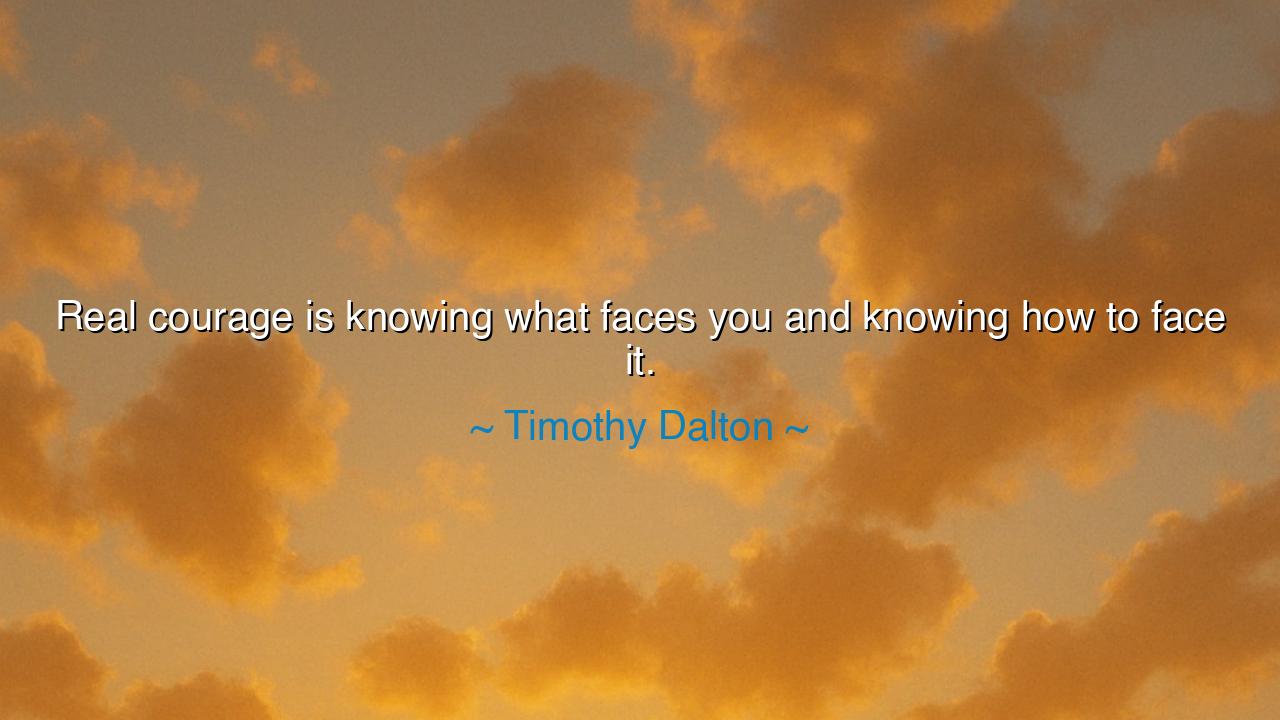
Real courage is knowing what faces you and knowing how to face






The actor and thinker Timothy Dalton, whose voice has often carried the gravitas of kings and warriors, once spoke these immortal words: “Real courage is knowing what faces you and knowing how to face it.” Though born from the lips of a man known for his portrayal of heroes, these words reach far beyond the stage or screen—they touch the very essence of the human spirit. In this statement lies the timeless wisdom that courage is not blind recklessness, nor the absence of fear, but the clear-eyed acknowledgment of danger, pain, or loss—and the will to confront them with strength and purpose. True bravery, Dalton reminds us, is not found in ignorance of peril, but in the conscious act of meeting it with dignity and resolve.
The origin of this insight rests in the understanding of courage as an ancient virtue, revered by every civilization that has walked the earth. The Greeks called it andreia, the Romans virtus, the East shen yong, yet all spoke of the same fire within the soul—the capacity to act rightly in the face of fear. Dalton, a student of both art and humanity, expresses in his simple words what the philosophers of old taught in tomes: that real courage is not born of impulse, but of clarity. To “know what faces you” is to see life’s trials without illusion—to recognize the full measure of what must be endured or overcome. And to “know how to face it” is to meet that truth with calm wisdom, neither fleeing nor surrendering to despair.
This truth has been proven again and again in the annals of history. Consider the life of Sir Ernest Shackleton, the explorer who led his men into the frozen wilderness of Antarctica. When his ship, the Endurance, was trapped and crushed by ice, he faced what seemed certain death. There was no ignorance in his courage; he understood fully the brutal cold, the starvation, the endless desolation that awaited them. Yet he refused to yield. He guided his men across the merciless sea to safety, never losing one soul under his care. Shackleton’s heroism was not the rash defiance of danger, but the conscious mastery of it. His courage lay in knowing the full extent of the storm—and stepping forward anyway.
This is the heart of real courage: awareness joined with action. The fool rushes forward blind to consequence; the coward sees danger and turns away. But the brave soul stands at the threshold, fully aware of the cost, and says, “I will face it.” Such courage is not confined to the battlefield or the mountain pass; it is found in every human life. The parent who rises each morning to care for a child through illness; the worker who endures hardship for the sake of family; the voice that speaks truth when silence would be safer—these too are warriors of the spirit. For courage is not measured by the size of the foe, but by the strength of the heart that confronts it.
Dalton’s words also speak to the wisdom that must accompany bravery. To “know how to face it” is not simply to resist, but to face life’s trials with intelligence, grace, and balance. The ancients taught that courage must be guided by reason, for untempered valor becomes destruction. The samurai of old Japan understood this harmony; their courage was never wild, but disciplined, rooted in purpose. Likewise, in our own lives, the battle we face—whether against fear, injustice, or grief—requires not only willpower, but understanding. It is not enough to charge into difficulty; one must meet it with patience, wisdom, and faith.
In a world that often glorifies outward strength, Dalton reminds us of the quiet courage that lives within reflection and awareness. It is easy to act boldly when we do not comprehend the risks; far harder when we see them clearly. The firefighter who enters a burning building, the doctor who stands firm in a plague, the ordinary person who endures loss yet keeps loving—all embody real courage. They do not act because they are fearless, but because they have chosen to rise above fear. This is the courage of the awakened heart, the courage that changes the world not through conquest, but through compassion and endurance.
So, my child, take this lesson to heart: do not seek to be fearless; seek to be wise. Let your eyes be open to what stands before you, and your heart steady in how you meet it. When trials come—and they will—do not flee in terror, nor charge blindly in pride. Instead, breathe, understand, and act with purpose. For real courage is not the roar of the lion, but the steady beat of the heart that refuses to falter. It is the grace to face life as it is, and still choose to walk forward in hope.
Thus, the words of Timothy Dalton become a guiding torch for every soul: that courage is not found in the ignorance of danger, but in the knowledge of it—and the will to confront it with wisdom. For the one who knows what faces them and yet dares to face it is truly free, and in that freedom, they find not only bravery, but the deepest form of peace.






AAdministratorAdministrator
Welcome, honored guests. Please leave a comment, we will respond soon